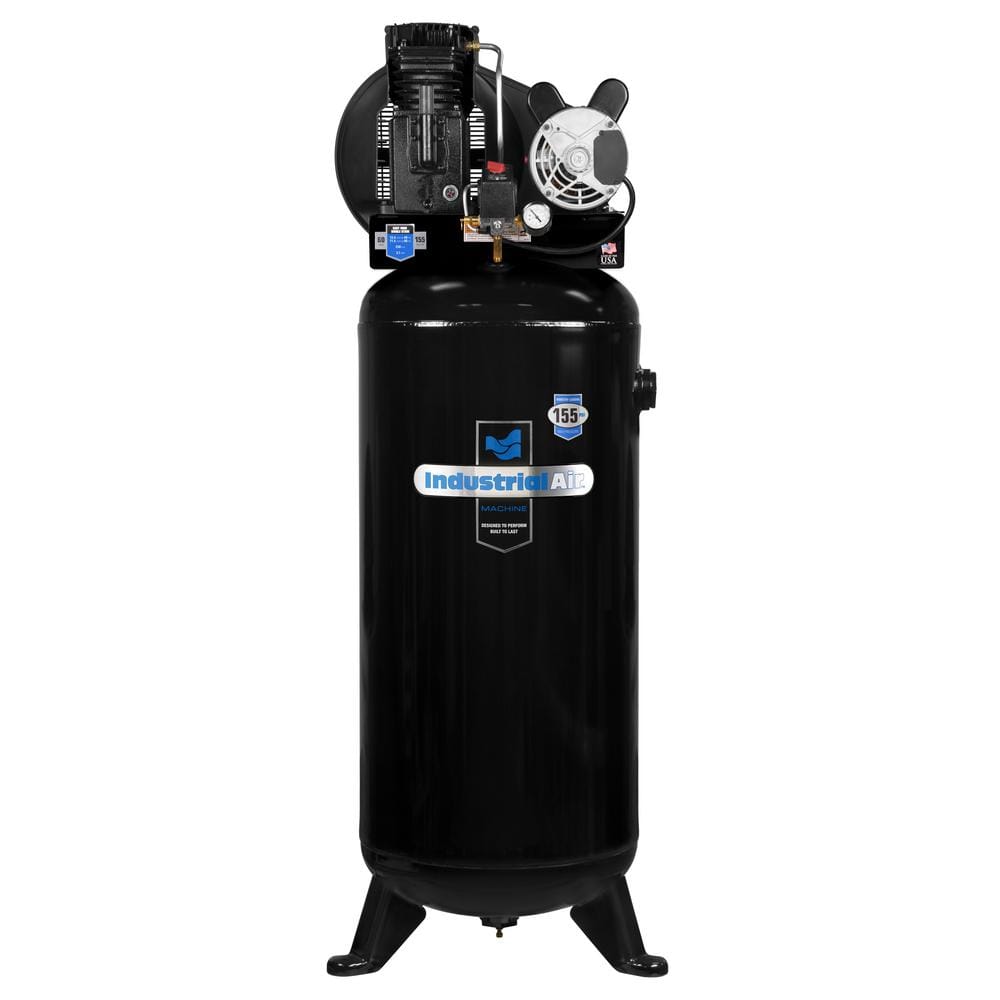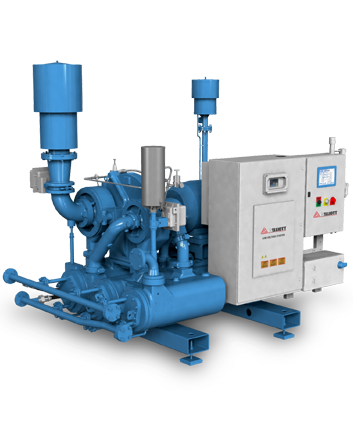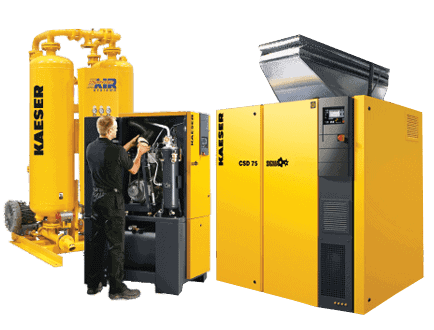Industrial air compressors are machines that convert power into potential energy stored as pressurized air. They are essential for various applications in manufacturing, construction, and automotive industries.
Air compressors play a vital role in powering tools and equipment. Their efficiency can significantly enhance productivity and reduce operational costs. Many industries rely on compressed air for tasks like painting, pneumatic control systems, and material handling. Different types of compressors, such as rotary screw and reciprocating models, cater to specific needs and budgets.
Selecting the right industrial air compressor involves considering factors like pressure requirements, airflow, and energy efficiency. Understanding these aspects can help businesses optimize their operations and achieve better results. Investing in a quality compressor can lead to long-term savings and improved performance.
The Role Of Air Compressors In Industry
Air compressors play a vital role in various industrial operations. They convert power into potential energy stored as compressed air. This stored energy powers tools and equipment, enhancing efficiency and productivity. Their versatility makes them essential in multiple sectors.
Key Applications In Various Sectors
Air compressors are used in diverse industries. Here are some key applications:
| Industry | Application |
|---|---|
| Manufacturing | Pneumatic tools, assembly lines, and material handling. |
| Construction | Powering jackhammers, nail guns, and concrete sprayers. |
| Aerospace | Testing components and cleaning parts with compressed air. |
| Automotive | Painting, tire inflation, and engine testing. |
| Food and Beverage | Packaging, bottling, and cleaning equipment. |
Impact On Productivity
Air compressors significantly boost productivity across industries. They provide reliable power for various tasks.
- Efficiency: Compressed air operates tools faster.
- Cost-effective: Reduces labor costs by automating processes.
- Versatility: Powers multiple tools with one unit.
- Space-saving: Compact designs fit in tight areas.
- Safety: Less risk of electric shock with pneumatic tools.
Utilizing air compressors leads to quicker production times. Industries can respond faster to market demands. This adaptability positions businesses for success.
Types Of Industrial Air Compressors
Understanding the different types of industrial air compressors is vital for choosing the right one. Each type serves specific needs and applications. Here’s a look at the main types:
Reciprocating Compressors
Reciprocating compressors use a piston to compress air. They are popular for their efficiency and simplicity.
- Available in single-stage and multi-stage designs.
- Ideal for low to medium air demands.
- Commonly found in workshops and small industries.
Key features include:
| Feature | Description |
|---|---|
| Pressure Range | Up to 500 psi |
| Power Source | Electric or gasoline |
| Maintenance | Regular oil changes needed |
Rotary Screw Compressors
Rotary screw compressors use two helical screws to compress air. They are efficient for continuous operation.
- Suitable for large-scale industrial applications.
- Lower maintenance compared to reciprocating types.
- Operate quietly, reducing noise pollution.
Key features include:
| Feature | Description |
|---|---|
| Pressure Range | Up to 150 psi |
| Power Source | Electric |
| Efficiency | High, with minimal energy loss |
Centrifugal Compressors
Centrifugal compressors use a rotating impeller to increase air pressure. They are best for high-volume applications.
- Ideal for large industries and power plants.
- Capable of delivering a continuous air supply.
- Efficient for high-pressure applications.
Key features include:
| Feature | Description |
|---|---|
| Pressure Range | Up to 100 psi |
| Power Source | Electric or natural gas |
| Maintenance | Low, requires periodic checks |
Selecting The Right Air Compressor
Selecting the right air compressor is crucial for efficient operations. A suitable compressor ensures optimal performance and productivity. Several factors influence this choice, including capacity, pressure, and energy efficiency.
Capacity And Pressure Requirements
Understanding your specific needs helps in choosing the right compressor.
- Capacity: This refers to the volume of air needed.
- Pressure: This is the force required to operate tools.
Consider the following table for common applications:
| Application | Required Capacity (CFM) | Required Pressure (PSI) |
|---|---|---|
| Spray Painting | 10-15 CFM | 40-60 PSI |
| Pneumatic Tools | 5-10 CFM | 90-100 PSI |
| Inflating Tires | 3-5 CFM | 30-40 PSI |
Choose a compressor that meets or exceeds these requirements. This ensures smooth operation without interruptions.
Energy Efficiency Considerations
Energy efficiency is vital for reducing operational costs. Compressors consume a lot of energy. Selecting an efficient model saves money.
- Variable Speed Drives: Adjusts motor speed based on air demand.
- Heat Recovery: Utilizes waste heat for other processes.
- Proper Maintenance: Regular checks keep systems running efficiently.
Consider these points:
- Look for Energy Star certified models.
- Check the compressor’s energy consumption rating.
- Evaluate the total cost of ownership.
Investing in an energy-efficient air compressor pays off in the long run.
Energy Efficiency And Sustainability
Industrial air compressors play a vital role in energy efficiency and sustainability. They help reduce energy consumption and lower operational costs. Many industries now focus on eco-friendly practices. Advanced technologies make compressors more efficient and less harmful to the environment.
Innovations In Design
New designs in air compressors focus on minimizing energy use. Here are some key innovations:
- Variable Speed Drives (VSD): Adjusts motor speed to match demand.
- Heat Recovery Systems: Captures and reuses waste heat.
- Smart Controls: Monitors and optimizes compressor performance.
These features lead to significant energy savings. Companies report reduced energy bills and improved efficiency.
Environmental Benefits
Investing in energy-efficient compressors offers various environmental benefits:
| Benefit | Description |
|---|---|
| Reduced Carbon Footprint | Lower energy consumption cuts greenhouse gas emissions. |
| Less Noise Pollution | Quieter models improve workplace environments. |
| Resource Conservation | Efficient designs use less energy and materials. |
Embracing these technologies enhances sustainability. Companies contribute to a healthier planet while reducing costs.
Maintenance Best Practices
Keeping your industrial air compressor in top shape is crucial. Regular maintenance helps ensure longevity and efficiency. Proper care can prevent costly repairs and downtime.
Routine Checks
Routine checks are essential for optimal performance. Follow this checklist:
- Inspect Air Filters: Clean or replace them regularly.
- Check Oil Levels: Maintain proper oil levels to avoid damage.
- Examine Hoses: Look for cracks and wear.
- Monitor Pressure Levels: Ensure they meet manufacturer specifications.
- Test Safety Valves: Ensure they function correctly.
Schedule these checks at least once a month. Use a maintenance log to track your activities.
Troubleshooting Common Issues
Even with routine checks, problems can arise. Here’s a guide to troubleshoot common issues:
| Issue | Possible Causes | Solutions |
|---|---|---|
| Low Pressure | Blocked air filters | Clean or replace filters |
| Unusual Noises | Loose parts | Tighten or replace parts |
| Overheating | Insufficient lubrication | Check and refill oil |
| Frequent Shutdowns | Faulty electrical connections | Inspect and repair connections |
Address these issues promptly. Regular monitoring can prevent larger problems.

Credit: www.homedepot.com
Cost Analysis Of Air Compressor Systems
Understanding the cost of air compressor systems is crucial for businesses. This analysis helps in making informed decisions. It involves comparing initial investments with long-term savings. A smart investment can lead to significant cost reductions.
Initial Investment Vs. Long-term Savings
The initial cost of an air compressor can vary widely. Factors include size, type, and brand. Here’s a quick overview of common types and their costs:
| Type of Compressor | Initial Cost Range |
|---|---|
| Reciprocating | $1,000 – $5,000 |
| Rotary Screw | $5,000 – $30,000 |
| Centrifugal | $25,000 – $100,000 |
Long-term savings come from reduced energy costs and maintenance. A well-chosen air compressor can lower utility bills. Consider these factors for long-term savings:
- Energy efficiency ratings
- Maintenance frequency
- Durability of components
Analyzing Total Cost Of Ownership
Total Cost of Ownership (TCO) includes all costs over a compressor’s lifespan. This includes:
- Initial purchase price
- Installation costs
- Energy consumption
- Maintenance and repair costs
- Replacement parts
Use this formula to calculate TCO:
TCO = Initial Cost + Installation + (Energy Cost x Lifespan) + Maintenance
Analyzing TCO helps in choosing the right compressor. A lower initial cost may lead to higher long-term expenses. Always consider energy efficiency and maintenance needs.
Investing in quality air compressors pays off. They often have lower TCO than cheaper models. Focus on both upfront costs and long-term savings.
Future Trends In Air Compressor Technology
The air compressor industry is evolving rapidly. New technologies enhance efficiency and reduce costs. Future trends focus on smart solutions and advanced materials. These advancements promise better performance and sustainability.
Smart Compressors And Iot
Smart compressors are changing the game. They utilize the Internet of Things (IoT) for improved monitoring. Here are key benefits:
- Real-time data collection and analysis
- Remote monitoring capabilities
- Predictive maintenance to reduce downtime
These features help companies save money. Smart compressors adjust performance based on real-time data. This leads to energy savings and increased productivity.
Many manufacturers now integrate IoT technology into their products. This trend is expected to grow. The focus will be on user-friendly interfaces and seamless connectivity.
Advancements In Compressor Materials
New materials are revolutionizing air compressor design. Lightweight and durable materials improve efficiency. Here are some notable advancements:
| Material Type | Benefits |
|---|---|
| Composite Materials | Reduced weight, increased durability |
| Advanced Alloys | Better heat resistance, longer lifespan |
These materials enhance performance under extreme conditions. Companies can expect lower maintenance costs and higher reliability.
The future will see a shift towards sustainable materials. This aligns with global goals for environmental responsibility. Manufacturers will focus on reducing their carbon footprint.

Credit: www.fs-elliott.com
Case Studies: Air Compressors In Action
Industrial air compressors play a vital role in various sectors. They drive efficiency and productivity. Let’s explore real-world examples of their impact.
Manufacturing Success Stories
Many manufacturers rely on air compressors for daily operations. Here are some success stories:
- Company A: Improved assembly line speed by 30% using a rotary screw compressor.
- Company B: Reduced energy costs by 20% with a variable speed drive compressor.
- Company C: Enhanced product quality by maintaining consistent air pressure.
These companies reported significant gains:
| Company | Improvement | Percentage |
|---|---|---|
| Company A | Assembly Line Speed | 30% |
| Company B | Energy Costs | 20% |
| Company C | Product Quality | Consistent |
Energy Sector Efficiency Gains
The energy sector has also seen benefits from air compressors. Here are key examples:
- Utility Company D: Decreased downtime by 15% with efficient air systems.
- Utility Company E: Lowered maintenance costs by using smart compressors.
- Utility Company F: Enhanced safety with reliable compressed air systems.
Efficiency gains in this sector are impressive:
| Company | Benefit | Percentage |
|---|---|---|
| Utility Company D | Downtime Reduction | 15% |
| Utility Company E | Maintenance Cost | Lowered |
| Utility Company F | Safety Improvement | Enhanced |
These case studies highlight the power of industrial air compressors. They drive success across various industries.

Credit: www.compressedairsystems.com
Frequently Asked Questions
What Are Industrial Air Compressors Used For?
Industrial air compressors are essential for powering various tools and machinery. They provide compressed air for applications like pneumatic tools, painting, and manufacturing processes. These compressors help improve efficiency and productivity in industrial settings by delivering a reliable air supply.
How Do I Choose The Right Air Compressor?
Choosing the right air compressor involves considering several factors. Assess your specific air needs, such as pressure and volume. Additionally, evaluate the compressor’s power source, portability, and maintenance requirements. Researching brands and reading reviews can also guide you in making an informed decision.
What Maintenance Do Industrial Air Compressors Need?
Regular maintenance is crucial for industrial air compressors. Key tasks include checking oil levels, replacing filters, and inspecting hoses for wear. Scheduled servicing helps prevent breakdowns and extends the compressor’s lifespan. Always refer to the manufacturer’s guidelines for specific maintenance recommendations.
How Energy-efficient Are Industrial Air Compressors?
Energy efficiency varies among industrial air compressors. Modern models often feature advanced technologies that reduce energy consumption. Look for compressors with high-efficiency ratings and variable speed drives. Investing in energy-efficient models can lead to significant savings on operating costs over time.
Conclusion
Choosing the right industrial air compressor can significantly boost your operations. Consider factors like capacity, energy efficiency, and maintenance needs. A well-selected compressor enhances productivity and reduces costs. With the right information, you can make an informed decision that benefits your business for years to come.
Invest wisely and reap the rewards.

